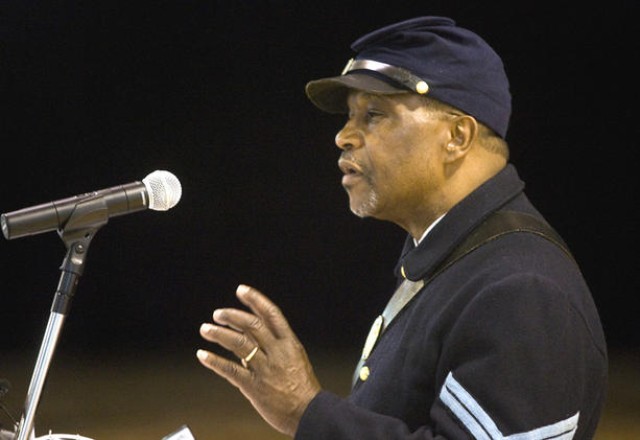
FORT GEORGE G. MEADE, Md. - Service members and civilians crowded into McGill Training Center on Feb. 24 for the post's annual Black History Month observance.
The 90-minute program featured speaker John Gourdin, a retired Marine master gunnery sergeant who is a researcher, author and lecturer on African Americans in the Civil War.
"It was a good chance to experience some more knowledge about African American history, being an African American in the military," said Cpl. Chris Clellen of the 741st Military Intelligence Battalion.
The 704th MI Brigade sponsored this year's annual observance.
"The month of February [is] reserved for celebrating and recognizing the contributions and determined efforts of numerous African Americans who helped our American society," said Staff Sgt. Charles Sheffield of the 741st MI Battalion.
Donning a Union uniform, Gourdin discussed some African Americans who participated in the war. All-black regiments were organized a few years into the war, after President Abraham Lincoln signed the Emancipation Proclamation in January 1863.
"A vast flood of runaway slaves [were] getting away from the plantations and breaking through the Union lines, trying to enlist in black regiments," Gourdin said.
To receive pensions after the war, African American veterans needed to prove they served. They did this through personal interviews about their experiences.
"Most African American veteran-Soldiers [who served] in the Civil War have a pension record of anywhere from 100 to 350 pages -- in their own words," Gourdin said.
During the war, about 180,000 Soldiers and 80,000 Sailors were African American.
Among those was Sgt. William Carney, the first African American to be awarded the Medal of Honor.
"Who would have thought that there were blacks who earned the Medal of Honor during the Civil War'" Gourdin asked. "There were a total of 17 [African American] Soldiers who won the Medal of Honor and 82 Sailors."
Sgt. Maj. Christian Fleetwood held the highest rank of any African American when he was awarded the Medal of Honor for his actions at the Battle of Chaffin's Farm in 1864.
Sgt. Andrew Jackson Smith was the last African American who fought in the Civil War to be awarded the Medal of Honor. The award was presented posthumously to his family in 2001 by President William Jefferson Clinton.
Gourdin also discussed other important African Americans during the Civil War such as Robert Smalls, who commandeered a Confederate ship filled with maps and ammunition. He returned the ship to the Union and was awarded a bounty of $15,000 that he used to purchase the land where he was once a slave. Smalls, who cared for his owner's wife until she died, went on to serve in the South Carolina Senate and the U.S. Senate.
Harvard graduate Martin Delany traveled to Washington, D.C., to meet with the president after the signing of the Emancipation Proclamation. Gourdin said that Delany told a friend, "I'm not here to ask him for anything, I'm here to offer [the President] my service."
Delany impressed Lincoln so much that he was promoted to major on the spot. "The president told [the Secretary of War] 'This man is equal to any man. He should be used to the best benefit of the war,' " Gourdin said.
African American women also played a role during the war. Susie King Taylor went to South Carolina where the 15-year-old served as a cook, nurse and teacher for African American Soldiers.
Achievements of African Americans was not the only topic discussed.
"Although this month is mainly established to celebrate and honor the work of African Americans, it signifies unity and recognition, cutting across racial and geographical barriers," Sheffield said at the program's start.
Col. Robert Shaw, a white officer in charge of an all-African American regiment, was killed with his men at Fort Wagner in South Carolina. His body was placed in a ditch with his company, despite the Union trying to recover his body.
"His parents said: 'Let's leave him there. He trained with them, he fought with them, he died with them. It would be his desire to remain with them,' " Gourdin said.
Another white officer who helped African Americans with his actions during the war was Lt. Gen. Benjamin Butler.
"Benjamin Butler was probably the first person to make a real difference," Gourdin said.
Prior to Butler, a slave that ran to the Union during a battle was returned to the Confederacy. Butler declared that runaway slaves were contraband of war, so any slave who broke the Union line was allowed to stay with the Union troops -- as free men.
These people helped give way to what Gourdin calls the "Black Man's Bill of Rights."
"Through the efforts of these Soldiers, Sailors, women [and] officers, at the end of 1865, the 13th amendment was passed, which actually ended slavery in America," Gourdin said. "In 1868, the 14th Amendment passed, giving citizenship, and in 1870, the right to vote."
After the program, several audience members discussed the presentation.
Sgt. 1st Class Kimberly Fairbanks of the Warrior Transition Unit said she was interested in the African American women involved in the Civil War.
"I think women have always played a very instrumental role in supporting our Army, even back when we were still slaves," Fairbanks said.
As a Civil War buff and a history major in college, Capt. Steven Patterson of the 742nd MI found Gourdin's presentation interesting as well as informative.
"This is a very important piece of our history," Patterson said. "History is a lot of what makes us who we are."

Social Sharing